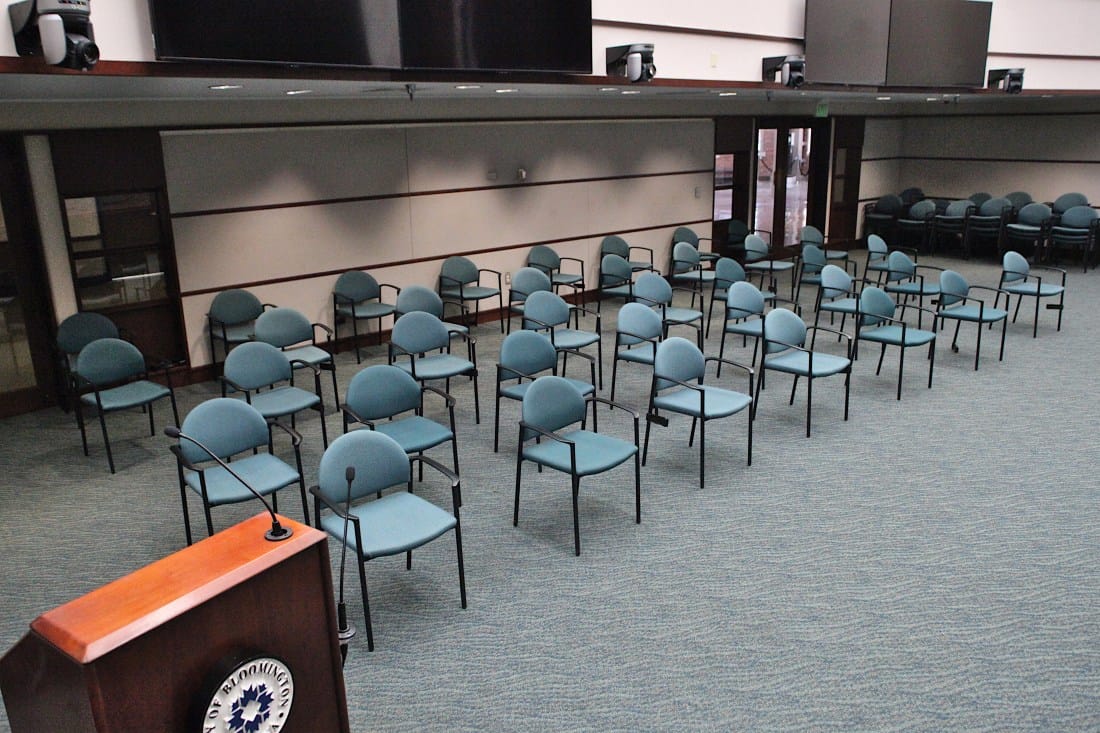From utilities building to city hall, Bloomington’s COVID-19 response shows visible signs


On Thursday, Indiana’s governor, Eric Holcomb, announced additional statewide measures meant to help reduce COVID-19 infection rates. The number of cases in the state of Indiana has doubled from six on Tuesday (March 10) to 12 cases two days later (March 12).
Among the measures announced by Holcomb on Thursday was a prohibition of non-essential gatherings of more than 250 people. About the scope of the prohibited gatherings, the press release states, “This includes any event or gathering of people who are in one room or a single space at the same time, such as cafeterias …”
Here in Bloomington, The Square Beacon saw evidence of Bloomington’s city government efforts to reduce COVID-19 infections, from the utilities service building on Miller Drive to city hall.
At a meeting of the utilities service board (USB) on Thursday afternoon, utilities director Vic Kelson alerted board members to some COVID-19 measures that City of Bloomington Utilities (CBU) is considering.
Kelson also said CBU might halt disconnections due to nonpayment, until the danger of infection has passed. He added that a lot of utilities around the country are holding off on disconnections due to nonpayment. Responding to an emailed question, Holly McLauchlin, CBU’s public affairs specialist, said that CBU typical does 130 to 150 shutoffs in a month.
A press release issued by Bloomington the day before (Wednesday) announced that board and commission meetings would be “significantly reduced.” But Kelson told board members that the USB is a critical function so meetings won’t be eliminated. Bills can’t be paid and contracts can’t be signed without USB approval, Kelson told them.
But USB meetings for at least the next while would be pared down to include just the mandatory items like approval of minutes, claims, and contracts, according to Kelson. No public comment would be offered, Kelson said. The IT department is working on a way for the public to make comments that can be read into the record of meetings, Kelson said.
Indiana’s Open Door Law, which requires meetings to be accessible to the public, does not require that members of the public be given an opportunity to speak.
Chris Wheeler, from the city’s legal department, told the USB that the public is still welcome to attend USB meetings. But the city is working on “politely worded” statement suggesting that it’s also an option to stay home and watch the meetings on Community Access Television Services (CATS), according to Wheeler.
Kelson said that CBU is also considering closing the front door and providing customer service only by phone and email. That would help CBU prevent viral transmission to and from the public, Kelson said.
The operation of the distribution and collection system is CBU’s highest priority, Kelson said. He added that the water is safe to drink—you don’t need bottled water.
Noticeable to any frequent visitor to city hall on Thursday afternoon, was a change to city council chambers, which are visible through glass doors from the lobby. At least every other chair for the audience had been removed and stacked to the side to create more space between attendees. That’s part of a recommended “social distancing” strategy to reduce the chance of COVID-19 infection.
Also apparently as a part of the social-distancing strategy, the city council’s administration committee moved its scheduled Thursday meeting location, a small conference room inside the clerk/council office, to the more commodious Hooker Conference room on the second floor. Councilmember Sue Sgambelluri started and concluded the meeting by wiping down the table with disinfectant clothes available from a dispenser on the table.
To reduce the number of people in the room, two representatives from the human resources department Skyped into the administration committee meeting. But some audio issues could not get sorted out, and the two HR reps wound up attending the committee meeting.
Small talk at the administration committee meeting included the cancelled travel plans of a company called Granicus, which was planning to send representatives to Bloomington to pitch its software to Bloomington. Instead of sending people to Bloomington, Granicus wants to arrange for a webinar. Granicus builds software for managing the documents associated with meetings of government councils, boards and commissions.
The city of Bloomington has set up a webpage with information on COVID-19 protocols.




Comments ()